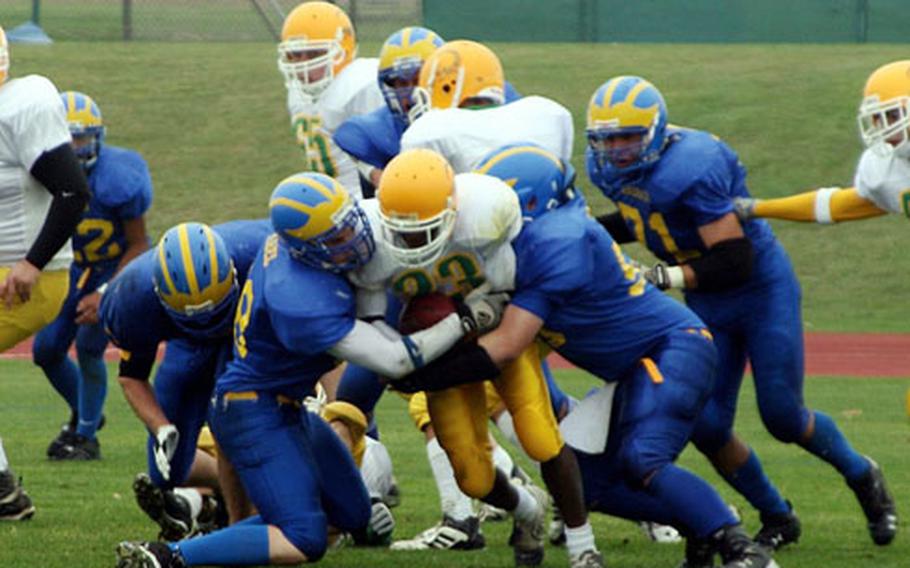
Ansbach linemen Tim Abel, left, and T.J. Dignan put the clamps on Cologne ball carrier Yves Balekelay during Ansbach’s 59-0 victory at Ansbach, Germany, on Oct. 11. Closing on the Cologne runner is Donavan Purdum (71). (Photo courtesy of Detlev Prautzsch)
Despite some logistical problems and lopsided scores, DODDS-Europe football coaches would like to continue expanding the number of games between local clubs and American high school teams.
"I think it worked out well," said Ansbach’s Marcus George of the expansion from two games against locals in 2007 to a scheduled 11 in ’08. "We’d like to play more."
Because of variations between the European and American seasons, only eight of the games actually were played. Even so, George, whose team won the Division II championship, saw plenty of positives in the games that kicked off as scheduled.
"Europeans play their season in the spring," he said, "and have lots of their players called up to play on all-star teams in the fall. Giessen (which fell 36-0 to Kaiserslautern) had nine of their starters called up to the all-star team for the German Bowl in Berlin that day. But they came down and played anyway."
In addition to Kaiserslautern, six other American teams prevailed over the local clubs last season. A 14-14 tie between D-III Hohenfels and the Munich Rangers was the only outcome standing between DODDS schools and an all-victorious season against their host-nation foes. Over the past two seasons, DODDS schools are 9-0-1 against European clubs.
However, George, whose Cougars whacked the Cologne Crocodiles 59-0, was referring to more than the final scores when he pronounced the experiment successful.
"To me, [playing local clubs] is ideal for the early season," he said. "It’s better than traveling 14 hours to play another DODDS school. Instead, we could play three or four teams locally, save money, save travel time and still play our conference schedule. It’s a great way to enrich the season."
Heidelberg’s Brad Shahan, whose Lions won the D-I crown, also is receptive to the idea of games against Europeans, as long as they come up in the proper order.
"Early in the season, it’s like a scrimmage for us," said Shahan, whose Lions clubbed an Amsterdam team 38-0. "It gives us a look at different styles we might not see against American teams."
Neither coach drew any conclusions about talent levels from their teams’ lopsided victories.
"There were some good athletes on their team," Shahan said. "They just weren’t as prepared as American teams are."
George agreed.
"They got to see the speed and intensity of our game," he said. "Practicing just twice a week, they weren’t at the level of our conditioning. They wore down as the game went on."
George said, however, that both teams enjoyed their encounter.
"We had them down the night before the game," he said. "Their kids were very receptive to ours, and our kids enjoyed entertaining them. We had a great time.
"We’re working on establishing closer relations with local teams."
That would likely include more games.
"It would really be positive for us to play local teams the first two games of the season," Shahan said, "especially as the American schools draw down."